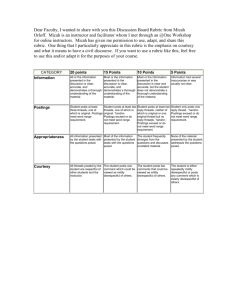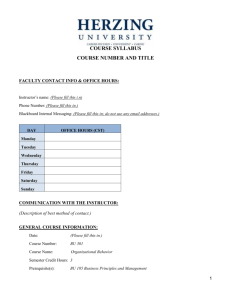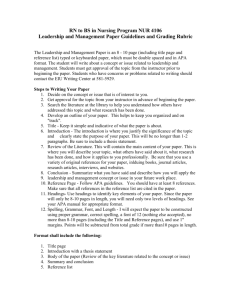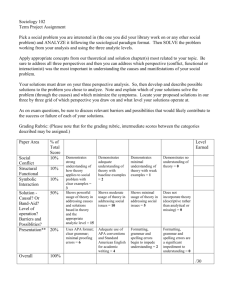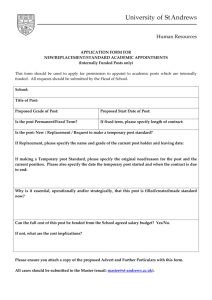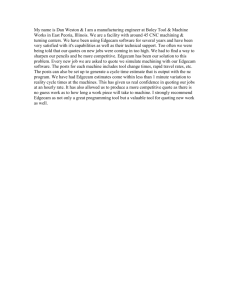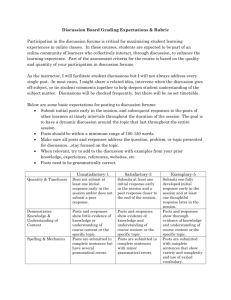course syllabus - Blackboard Learn
advertisement
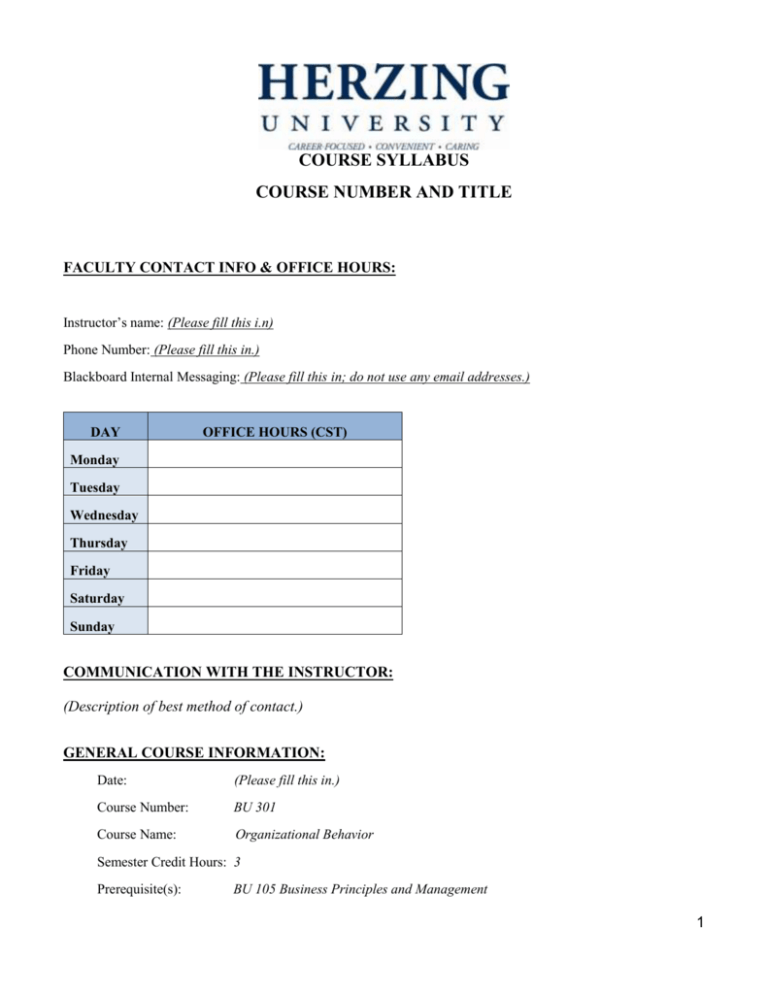
COURSE SYLLABUS COURSE NUMBER AND TITLE FACULTY CONTACT INFO & OFFICE HOURS: Instructor’s name: (Please fill this i.n) Phone Number: (Please fill this in.) Blackboard Internal Messaging: (Please fill this in; do not use any email addresses.) DAY OFFICE HOURS (CST) Monday Tuesday Wednesday Thursday Friday Saturday Sunday COMMUNICATION WITH THE INSTRUCTOR: (Description of best method of contact.) GENERAL COURSE INFORMATION: Date: (Please fill this in.) Course Number: BU 301 Course Name: Organizational Behavior Semester Credit Hours: 3 Prerequisite(s): BU 105 Business Principles and Management 1 COURSE DESCRIPTION: This course examines the nature of organizational behavior through the study of group and intergroup relations, organizational design, and the structure and factors affecting organizational design. Topics include the external environment; the impact of technology, power and politics; and organizational change and development. COURSE LEARNING OBJECTIVES: 1. Describe the relationship between learning and behavior modification in an organization. 2. Discuss the theory of incentive plans. 3. Explain how learning, perception, attitudes, values, and ethics affect and influence individual’s behavior with an organization. 4. List the basic considerations to be taken in setting up work groups. 5. Describe some techniques used to effectively manage groups. 6. Explain the relationship between intergroup behavior and performance. 7. Explain the influences that an individual has on stress and stress management. 8. Describe some strategies for resolving conflict in an organization. 9. Describe the strategies that an organization can use to plan for short-term and long-term change. REQUIRED TEXT(S): DuBrin, A. J. (2007). Fundamentals of Organizational Behavior 4e. Australia, Canada, Mexico, Singapore, Spain, United Kingdom, United States: Thomson South-Western. SUPPLEMENTAL INSTRUCTIONAL MATERIALS: PowerPoint slides, articles, links found in Blackboard each week. CLASSROOM POLICIES: WRITTEN ASSIGNMENTS: Follow detailed assignment instructions including the Research Paper. Be sure to use APA format, proper grammar, and spelling. DISCUSSION BOARDS: A "threaded discussion" is a discussion forum that allows one user to begin a discussion by entering a message that can be read by other users (original post), who can then add their own comments in response to the original message. Other users can then add their responses to these comments. Thus, the discussion is "threaded" as one comment leads to another and another. Unlike chat rooms and other "real-time" interaction forums, threaded discussions do not require different users to be logged on at the same time. Instead, an individual can enter and contribute to a threaded discussion at any time, responding to a message posted a day or even weeks earlier. Each week, students will have assigned discussion statements or questions. Questions will be available for students’ to post their primary posting by Sunday. Each student is required to answer each question 2 by initiating an original response (called a primary posting). Each original post must be a minimum of 150 words and incorporate concepts from lectures, textbooks and supplemental readings which should be highlighted in red and cited at the end of the posting. From Monday to Sunday, each student must post secondary responses to three or more of their colleague's posts for each discussion question with a minimum of 150 words or more by Sunday of each week. Secondary responses should also incorporate concepts and theory from textbook and supplemental readings. Students are expected to log on 4 times a week. Students are encouraged to embark on collaborative discussions in addition to the required secondary postings. The Instructor will participate in these discussions as well. Assessment is via the Threaded Discussion Rubric. IMPORTANT: The instructor reserves the right to change a threaded discussion assignment in advance should a current event emerge that is relevant to the course material. Any changes will be posted in the Announcement before that week’s session begins. CLASS PARTICIPATION: Attendance is defined as submission of assignments, exams, or discussion board posting. Each student is expected to log on at least 4 times a week. This standard is a minimum requirement. Herzing University suggests that students participate on a daily basis during the course. Participation is measured by a student’s contribution to the virtual classroom discussion board. A student contribution must add value to the course. A note is determined to be of substance by containing information that supplements, contradicts, questions, or furthers discussion on a subject area contained in the course. Notes such as “me too” and “I agree” and other notes not related to the course are not considered substantive notes for participation. For specific guidance students are encouraged to read the statement of expectations and evaluation rubric posted under the Discussion heading. Performance Expectations: All readings and review of PPTs, lectures, and supplementary materials is to be completed before the first day of the week. Demonstrate dependability, initiative, time-management, and organization and prioritization skills. Work responsibly, either independently or with a group of their peers, in the design, implementation, and presentation of course activities. Resolve group communication concerns and any personal/professional disagreements that may impede the course and its activities. Tardiness: Discussion forums are locked the first day of the subsequent week. Missing the opportunity to participate in the discussion will result in 0 pts being recorded for participation. There is no making up missed participation. Late Assignments will NOT be accepted. 3 LATE ASSIGNMENTS: Missing the opportunity to participate in the discussion will result in 0 pts being recorded for participation. There is no making up missed participation. Late Assignments will NOT be accepted. SUMMARY OF WEEKLY ASSIGNMENTS/ASSESSMENTS: Week 1 Week 2 Week 3 Week 4 Week 5 Week 6 Pre-test, APA Quiz, Readings ch 1,14,15, Assignment, Discussion: For this week's discussion we will: 1. Describe how studying organizational behavior relates to your chosen profession and 2. Describe the organizational culture and structure of an organization. Readings ch 2,3,4, Assignment, Discussion: 1. Describe your preferred learning style. Based on the four stages of learning orientation, given an example of how you learned something and 2. Describe the relationship between intelligence and job satisfaction. Readings ch 6,7, Assignment, Discussion: 1. What incentive plans motivates you? What other factors lead to your motivation? And 2. How does WIIFM explain why managers and professionals devote time to community and charitable activities? Readings ch 10,11, Assignment, Midterm exam, Discussion: 1. If you believe the leadermember exchange theory is valid, how would you try to be part of the in-group? And 2. Many managers feel that previous experience on a sports team prepares you for a workplace team. Therefore, many managers will attempt to hires those individuals with this experience. What is your reaction to this hiring practice? Readings ch 8,12, Assignment, Discussion: 1. Many people complain of email overuse in organizations on the job, how does email contribute to your effectiveness as a communicator? And 2. What are the negative consequences if managers ignore power, politics, and influence tactics in organizations particularly in work groups? Readings ch 5,9, Assignment, Discussion: 1. Critics of teams in organizations often ask "Have you ever seen a statue of a committee in a park?" What is the point of this statement and how would you respond? And 2. Describe a failed business decision. Why did it fail? What should be done differently to make it a success? Week 7 Readings ch 13,16,17, Assignment, Final project, Final Exam, Discussion: 1. What are some functional consequences of conflict? How can conflict be used to improve a particular situation? And 2. What steps can you take to prepare yourself to be a better multicultural manager? Week 8 Post Test, Discussion: 1. How can use apply the concepts from this course to your organization and professional preparation? And 2. What concept did you choose for your research project? Share at least 2 pieces of new information you gathered with you classmates. Assignment – Week 1 Library Assignment: Choose an Organizational Behavior topic of interest to you (review the Table of Contents of this book and the Index for Ideas) for your research paper. Choose a minimum of 10 scholarly (peer reviewed) sources related to your topic of interest for utilization in your research paper. It is recommended you print or save a copy of the sources so you can refer to them when writing your research paper. Create a reference page in APA format listing this sources. The final research paper will be 10 pages on the topic. You may find that you will need much more than 10 sources. See Writing Guidelines Document for formatting particulars & Written Papers Rubric for evaluation specifics under Course Info page. Below is the final project (due in week 7) outline: Project Outline: 4 Submit/Upload your assignment using the link below. Cover page Table of Contents Body of the paper on the selected topic with References cited within the text in APA Reference Page (based on assignment 1) Some potential topics might include: organizational change, stress, conflict management, decision making, groups/teams, leadership, personality, motivation, power and politics within the organization, succession planning, time management, etc. ***For this assignment (week 1), you are creating just a proposed reference page for the final project in APA format based on your chosen topic. Assignment – Week 2 1. 2. 3. 4. View the Supporting Lesson Links to the Web or other Media section of this course. Take the Garner's Multiple Intelligence's Test and the VAK Learning Styles Inventory. Take the Keirsey Temperament Sorter, the Big Five Personality Test, and the Jung Typology Test. Write a reflection paper about your newly acquired knowledge from the readings and links as well as the new knowledge about yourself. How does this knowledge relate to organizational behavior? How will this new knowledge and understanding be reflected in they way you prepare yourself professionally? 5. The required components include: 1. Title page 2. Brief summary of results 3. Identify and explain the relevant principles and theories. 4. Use the principles and theories to analyze your results 5. Conclusion 6. References Assignment – Week 3 Write a reflection paper using the theories and principles of motivation and incentives you have learned. You may want to do some further research on the topic. How will you use these theories and principles apply to you professionally? The required components include: 1. Title page 2. Brief summary of a situation 3. Identify and explain the relevant principles and theories. 4. Use the principles and theories to analyze the situation 5. Conclusion 6. References Assignment – Week 4 1. Write a reflection paper using the theories and principles of teamwork and leadership you have learned. Describe a situation when you were on a team and also a situation in which you were in a leadership role. How do these theories and principles of teamwork and leadership help with your professional development. 2. The required components include: 1. Title page 2. Brief summary of a situation 3. Identify and explain the relevant principles and theories. 4. Use the principles and theories to analyze the situation 5 5. Conclusion 6. References Assignment – Week 5 Review the case problem: Do we Need This Blogger? on p. 185-186 in your book and also the case problem: Infighting at DaimlerChrysler on p. 281-282. Write a case analysis for each case problem to apply what you have learned. The required components are: 1. Title page 2. Introduction including an overview of the business 3. State the problem or issue in a paragraph. 4. Describe the facts and assumptions of the case 5. Analyze the case and information that you have. Answer the questions at the end of the case. 6. Provide your recommendations in order to solve the problem. Provide at least three alternative solutions and support each with the materials from the chapter, your experience, and other sources. Choose an optimal solution. 7. Describe the consequences and implications of your recommendations. You may need to restate your assumptions. Provide an action plan. 8. Summary conclusion 9. References. Assignment – Week 6 1. Review the case problem: The Adam Aircraft Work Group/Team on p. 208-209. Write a case analysis to apply what you have learned. The required components are: 1. Title page 2. Introduction including an overview of the business 3. State the problem or issue in a paragraph. 4. Describe the facts and assumptions of the case 5. Analyze the case and information that you have. Answer the questions at the end of the case. 6. Provide your recommendations in order to solve the problem. Provide at least three alternative solutions and support each with the materials from the chapter, your experience, and other sources. Choose an optimal solution. 7. Describe the consequences and implications of your recommendations. You may need to restate your assumptions. Provide an action plan. 8. Summary conclusion 9. References. Assignment – Week 7 Read the case problem: Hard Charger Turned Soccer Mom on p. 311-312 and the case problem:What to do about Louie? on p. 404-405. Write a case analysis on each case to apply what you have learned. The required components are: 1. 2. 3. 4. 5. Title page Introduction including an overview of the business State the problem or issue in a paragraph. Describe the facts and assumptions of the case Analyze the case and information that you have. Answer the questions at the end of the case. 6 6. Provide your recommendations in order to solve the problem. Provide at least three alternative solutions and support each with the materials from the chapter, your experience, and other sources. Choose an optimal solution. 7. Describe the consequences and implications of your recommendations. You may need to restate your assumptions. Provide an action plan. 8. Summary conclusion 9. References. Assignment Grade distribution for references week 1 1. 10 Scholarly peer reviewed references (2 points for reference listed up to 10, .5 for each that is not scholarly peer reviewed up to 10) = 25 points 2. APA format – 5 points 3. Organizational behavior topic – 4 points Assignment Grade distribution for reflection paper – weeks 2, 3, and 4 1. 2. 3. 4. 5. 6. Title page 5 points Brief summary of results 5 points Identify and explain the relevant principles and theories. 7.5 points Use the principles and theories to analyze your results 7.5 points Conclusion 5 points References 6 points Assignment Grade distribution for each case study – weeks 5 & 7 (week 6 has only 1 case so double the values below) 1. 2. 3. 4. 5. 6. 7. 8. 9. Title page 3 points Introduction including an overview of the business 1.25 points State the problem or issue in a paragraph. 1.25 points Describe the facts and assumptions of the case 1.25 Analyze the case and information that you have. Answer the questions at the end of the case. 2.5 points Provide your recommendations in order to solve the problem. Provide at least three alternative solutions and support each with the materials from the chapter, your experience, and other sources. Choose an optimal solution. 2.5 points Describe the consequences and implications of your recommendations. You may need to restate your assumptions. Provide an action plan. 2.5 points Summary conclusion 1.25 points References. 2.5 points Assignment Grade distribution for Final research project paper 1. 10 page boy on the topic – 50 points 2. 10 scholarly peer reviewed sources. – 20 points 3. Cover page – 5 points 7 4. 5. 6. 7. Table of Contents – 5 points Body of the paper on the selected topic – 100 points References cited within the text in APA – 10 points Reference Page in APA format – 10 points Grade Summary Points Weight Discussions 250 25% Assignments 250 25% Midterm Exam 150 15% Final Exam 150 15% Final Project 200 20% Totals 1000 100% Grade Scale A 93% - 100% A- 90% - 92% B+ 87% - 89% B 83% - 86% BC+ 80% - 82% C 70% - 75% D+ 66% - 69% D 60% - 65% F I = < 59% Incomplete 76% - 79% 8 Item Percentage Due Date Pretest 0% Fill in specific date Meet & Greet 0% Fill in specific date Discussion 1 3.125% Fill in specific date Assignment 1 3.4% Fill in specific date Discussion 2 3.125% Fill in specific date Assignment 2 3.6% Fill in specific date Discussion 3 3.125% Fill in specific date Assignment 3 3.6% Fill in specific date Discussion 4 3.125% Fill in specific date Assignment 4 3.6% Fill in specific date Midterm 15% Fill in specific date Discussion 5 3.125% Fill in specific date Assignment 5 3.6% Fill in specific date Discussion 6 3.125% Fill in specific date Assignment 6 3.6% Fill in specific date Discussion 7 3.125% Fill in specific date Assignment 7 3.6% Fill in specific date Final Exam 15% Fill in specific date Final Project 20% Fill in specific date Post Test 0% Fill in specific date Discussion 8 3.125% Fill in specific date Total 100.00% Note: Please make sure total above is 100% 9 Grading Rubric for All Written Assignments A: Superior Work Intro Body: Organization Deliberate, creates interest Gives title/author if needed Clear, concise and specific thesis statement Organized throughout Logical, clear sequence Completely supports thesis Exhibits critical thinking Has consistent transitions Proper in-text citations B: Above average Body: Mechanics Adequately introduces topic Thesis statement may be lacking specificity. Uses excellent vocabulary well Stays on topic/meets assignment Correct tense/point of view Has sentence variety Correct spelling/punctuati on Writes in scholarly style Well organized Easy to follow Thesis could use more support (adequate but not extended) Majority of citations are correct Shows some original thought Has several transitions Majority of citations are correct Attempts higher level vocabulary with some success Stays on topic/meets assignment Mostly correct tense/point of view Sentences correct but lacking in variety Few spelling errors Writes in scholarly style Conclusion Appearance Deliberate closing strategy Does not introduce new material Paraphrases thesis, but does not merely repeat introduction Neat, properly D: Below F: Fails to Average meet requirements Body: Fluency C: Average Adequate closing Does not introduce new material Re-states thesis in same words, but does not completely repeat introduction May have a few Intro is too short – does not introduce topic Thesis statement is vagueshould be more narrow Some org. problems Some gaps in flow Not enough thesis support Shows little original thought Some transitions but lacking Citations are both correct and incorrect Both higher and lower vocabulary Some tense/point of view errors Meets assignment mostly, but occasionall y strays off topic Some sentence fragments/r un-ons/not varied Several preventable spelling errors Mix of formal and informal writing Weak closing Does not introduce new material Merely repeats introduction Some Some intro component s missing Thesis statement is poor or unidentifia ble Difficult to follow May jump topics Does not prove/support thesis Citations incorrect Very few transitions Vocabulary is very basic and incorrect Some tense/pov errors Attempts but does not succeed in meting assignment Many sentence fragments/r un-ons Many spelling errors Majority of writing is informal Weak closing Introduces new material Does not refer to thesis Improper Thesis missing Introduction does not introduce topic No sequence Jumps topics frequently No in-text citations No transitions Improper word choices Many tense and point of view errors Fails to meet assignment Many mechanical errors of all types Writes informally No formal closing New material introduced Does not refer to introduction Improper 10 formatted References in APA format formatting errors References mostly correct improper formatting References incomplete or incorrectly formatted format in most places References incomplete and incorrectly formatted format throughout No reference page Discussion Threads Grading Rubric Discussion Posting Guidelines and Discussion Threads Grading Rubric Weekly Discussions are required: All online courses should have weekly discussion questions and all weekly discussions should be graded. All graded discussions will include feedback in the grade center, under instructors’ comments, to let students know what they did well, why they received the point total that they did, and what they can improve upon the next time. Number of posts: Students are required to post 3 posts spread at least 3 or more days. The initial post should be the answer to the main discussion question and the other secondary posts should be students’ interactions with their peers’ posts. Quality of posts: The initial and secondary posts should be meaningful and should promote further discussion. Please refer to the discussion threads grading rubric for more about the quality of posts. Due Dates: Post your initial post by Wednesday of the week and the other secondary posts by Sunday midnight of the week. No discussion will take place when the week is over. Number of words: All discussion questions should be meaningfully answered. Please refer to the grading rubric. The number of words of the initial post should be no less than 250 and the number of words in each of the secondary posts should be no less than 100. Discussion Grades: The discussion question is worth 31.25 points (3.125% of your final grade). XXXX points are allocated to the initial post and XXXX points are allocated to secondary posts. Please refer to the Discussion Threads Grading Rubric for further information about discussion threads grading. 11 Discussion Threads Grading Rubric Discussion Threads Grading Rubric The Academic Dishonesty policy will be strictly followed and non-compliance with the policy will result in consequences as outlined in that policy. GRADE Quality of Initial Post A Examples of fully developed posts may include one or more of the following points: B C D F Examples of Examples of Examples of No discussion clearly defined partially posts that have post submitted posts may include developed posts not been one or more of may include developed may the following one or more of include one of points: the following the following points: points: Thorough use of key terms and concepts relevant to the discussion Correct use of key terms and concepts relevant to the discussion Minimal use of key terms and concepts relevant to the discussion No knowledge of the key terms and concepts relevant to the discussion Thoroughly incorporates textbook and other academic or professional resources Correctly incorporates textbook and other academic or professional resources Minimally incorporate s textbook and other academic or professional resources No use of textbook and other academic or professional resources Real-life experiences fully relate to the discussion Real-life experiences do not fully relate to the discussion Real-life experiences do not relate to the discussion No application of real-life experience 12 Discussion Threads Grading Rubric The Academic Dishonesty policy will be strictly followed and non-compliance with the policy will result in consequences as outlined in that policy. GRADE A B Comprehensive demonstration of analytical and cognitive thinking skills Thorough use of current events Use of correct spelling, grammar, and punctuation with no errors Initial Post Deadline Quality and Quantity of Secondary Posts Examples of fully developed posts may include one or more of the following points: C D F Demonstrates of analytical and cognitive thinking skills Limited demonstrati on of analytical and cognitive thinking skills No demonstrati on of analytical and cognitive thinking skills Correct use of current events Minimal use of current events No use of current events Use of correct spelling, grammar, and punctuation with minimal errors Incorrect spelling, grammar, and punctuatio n with multiple errors Incorrect spelling, grammar, and punctuatio n with many errors Mid-Week (e.g. Wednesday or Thursday, depending on the due date assigned by the Instructor) One day after the due date assigned by the Instructor Two days after the due date assigned by the instructor Last day of No discussion the week posts submitted (as defined by the Instructor) Examples of Examples of Examples of No discussion clearly defined partially posts that have posts submitted posts may include developed posts not been one or more of may include developed may the following one or more of include one of points: the following the following points: points: 13 Discussion Threads Grading Rubric The Academic Dishonesty policy will be strictly followed and non-compliance with the policy will result in consequences as outlined in that policy. GRADE A B C D Thorough use of key terms and concepts relevant to the discussion Correct use of key terms and concepts relevant to the discussion Minimal use of key terms and concepts relevant to the discussion No knowledge of the key terms and concepts relevant to the discussion Real-life experiences fully relate to the discussion Real-life experiences do not fully relate to the discussion Real-life experiences do not relate to the discussion No application of real-life experience Comprehensive demonstration of analytical and cognitive thinking skills Demonstrates of analytical and cognitive thinking skills Use of correct spelling, grammar, and punctuation with no errors Limited demonstrati on of analytical and cognitive thinking skills Use of Incorrect correct spelling, spelling, grammar, grammar, and and punctuatio punctuation n with with multiple minimal errors errors F No demonstrati on of analytical and cognitive thinking skills Incorrect spelling, grammar, and punctuatio n with many errors 14 Discussion Threads Grading Rubric The Academic Dishonesty policy will be strictly followed and non-compliance with the policy will result in consequences as outlined in that policy. GRADE A Meets or exceeds the required number of secondary posts as defined by the Instructor; posts are spread out over at least 3 days (including day of initial post) B Meets the required number of secondary posts as defined by the Instructor; posts are spread out over 2 days C Did not post the required number of secondary posts as defined by the Instructor; posts are submitted on the same day, prior to the last day D F Did not post the required number of secondary posts as defined by the Instructor; posts are submitted on the last day ACADEMIC DISHONESTY POLICY: Original Work, Cheating, Plagiarism, and Paraphrasing The Herzing University Catalog addresses academic dishonesty in general in the “Student Conduct” section of the University catalog. Original Work Cheating, Plagiarism, and Paraphrasing are addressed in greater detail here. When completing an assignment for a Herzing University course, students are expected to do original work for the assignment and to not reuse work they may have done in previous courses or other settings unless specific prior approval is granted by the instructor. Cheating is defined as “the giving or receiving of aid (whether written, oral or otherwise) in order for a student to receive undeserved credit on class work, homework, tests or any other assignment that is his or her own responsibility.” Plagiarism violates the central core of Herzing University’s educational philosophy. It involves stealing another person’s work and claiming it as one’s own. It occurs whenever one directly copies another person’s intellectual effort and integrates it into his/her class work without giving proper credit to the author. 15 Paraphrasing is defined as "a restatement of a text or passage giving the meaning in another form” (Webster’s New Universal Unabridged Dictionary, 1996). When one paraphrases but intentionally omits authorship of the work, this, too, is a serious violation of academic honesty. All Herzing University students have an individual responsibility to understand what cheating, plagiarism, and paraphrasing are. The student must also be aware that the consequences for cheating and plagiarism, or for paraphrasing without proper attribution, are severe. Whenever you have doubt about what constitutes cheating, plagiarism, or paraphrasing, contact your instructor. With the advent of the Internet, the potential for cheating by simply cutting and pasting information into a paper is tempting. Be aware that these dishonest activities will not be tolerated and instructors have access to increasingly sophisticated search engines to “test” the validity of student work. Plagiarism, in particular, is easily traced. Consequences and Sanctions Herzing University will, upon finding that a student has violated its policies on Academic Dishonesty, enact the following: 1. For the first offense the student may receive a zero on the assignment involved or a failing grade in the course. The student will be required to repeat the entire course if completion of a failed course is needed to graduate. 2. Upon a second offense, the student may be immediately and permanently expelled from the University. Academic Appeal Process The student is directed to the “Grievance/Complaint Procedure” and “Academic Appeal for Termination” sections of the Herzing University Catalog for information for petitioning the University to reconsider its action. To avoid academic dishonesty, proper references to any text and outside resources are ALWAYS required. You should also consult the following websites and resources or APA reference manual to comply with this requirement: APA Overview Presentation: https://herzing.blackboard.com/modules/_199_1/APA-6th-imp.jar Basics of APA Style: http://www.apastyle.org/ Electronic References: http://www.apastyle.org/manual/related/electronic-sources.pdf OWL (Online Writing Laboratory): http://owl.english.purdue.edu/owl/resource/560/01/ APA Tip Sheet: 6th Edition APA Tip Sheet AMERICANS WITH DISABILITIES ACT (ADA) POLICY: Herzing University is committed to addressing the needs of students who meet the criteria for special accommodations. It is the University’s policy to comply fully with federal and state laws, including Section 504 of 16 the Rehabilitation Act of 1973 and the Americans with Disabilities Act of 1990 (ADA), regarding students with disabilities. Information concerning the University’s policies and procedures related to a disability can be found in the Student Handbook and Academic Catalog. Contact the Online Campus Student Services Department for a copy of the "Request for Accommodation" documents should you have a need. ******************************************************** 17
